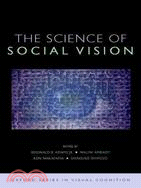The Science of Social Vision
商品資訊
系列名:Oxford Series in Visual Cognition
ISBN13:9780195333176
出版社:Oxford Univ Pr PBKUOXFM
作者:Reginald B. Adams Jr. (EDT); Nalini Ambady (EDT); Ken Nakayama (EDT); Shinsuke Shimojo (EDT)
出版日:2010/11/16
裝訂/頁數:精裝/471頁
規格:25.4cm*17.8cm*2.5cm (高/寬/厚)
定價
:NT$ 5320 元優惠價
:90 折 4788 元
若需訂購本書,請電洽客服 02-25006600[分機130、131]。
商品簡介
作者簡介
相關商品
商品簡介
The human visual system is particularly attuned to and remarkably efficient at processing social cues. We can effectively "read" others' mental and emotional states and make snap judgments about their characters and dispositions, simply by watching them. Given what is clearly a close relationship between vision and social interaction, it has become increasingly clear to social psychologists seeking to better understand the functional and neuroanatomical mechanisms underlying social perception that vision plays a critical role in the development and maintenance of social exchange. Likewise, vision scientists have come to appreciate the profound impact people, as social agents, have had on the visual system, acknowledging just how important it is to consider the socially adaptive functions that system evolved to perform.
The Science of Social Vision explores the biologically determined to the culturally shaped influences on social vision. Four themes emerge throughout the 25 chapters from leaders in the field. These include:
1) Visually mediated attention moderates complex social interactions and plays a critical role in the development of social cognition;
2) Visual features perceptually determine categorical thinking and have profound downstream consequences including stereotype activation;
3) Perceptual experiences can be directly triggered by visual cues, in which case, visual and social perception are essentially equivalent processes;
4) Social factors exert powerful top-down influences on even low-level visual perception, at some times biasing, while at others fine-tuning perceptual acuity.
This book heralds the new field of social vision, and showcases the cutting edge and broadly interdisciplinary research that is currently at its forefront. Together the perspectives drawn from these various fields offer unique insight into the origin, adaptive purpose, and cognitive, cultural, and biological underpinnings of social vision that will help to shape and guide the way we think about and examine social visual perception. The Science of Social Vision will provide a valuable resource for students and scholars across a wide range of fields, including cognitive, developmental, and social psychology, vision science, cognitive neuroscience, social neuroscience, and ethology.
The Science of Social Vision explores the biologically determined to the culturally shaped influences on social vision. Four themes emerge throughout the 25 chapters from leaders in the field. These include:
1) Visually mediated attention moderates complex social interactions and plays a critical role in the development of social cognition;
2) Visual features perceptually determine categorical thinking and have profound downstream consequences including stereotype activation;
3) Perceptual experiences can be directly triggered by visual cues, in which case, visual and social perception are essentially equivalent processes;
4) Social factors exert powerful top-down influences on even low-level visual perception, at some times biasing, while at others fine-tuning perceptual acuity.
This book heralds the new field of social vision, and showcases the cutting edge and broadly interdisciplinary research that is currently at its forefront. Together the perspectives drawn from these various fields offer unique insight into the origin, adaptive purpose, and cognitive, cultural, and biological underpinnings of social vision that will help to shape and guide the way we think about and examine social visual perception. The Science of Social Vision will provide a valuable resource for students and scholars across a wide range of fields, including cognitive, developmental, and social psychology, vision science, cognitive neuroscience, social neuroscience, and ethology.
作者簡介
Dr. Reginald B. Adams, Jr., Assistant Professor at The Pennsylvania State University, received his Ph.D. in experimental social psychology from Dartmouth College. Before coming to Penn State, he was awarded a National Research Service Award (NRSA) from the National Institute of Mental Health to train as a postdoctoral fellow at Harvard and Tufts Universities. His current research focuses on how multiply perceived nonverbal messages (e.g., emotion, gender, race, and age) combine and interact to form the unified social representations that guide our impressions of and responses to others.
Dr. Nalini Ambady, Professor and Neubauer Faculty Fellow at Tufts University, received her Ph.D. in social psychology from Harvard University and taught at Holy Cross College and Harvard University, where she was the John and Ruth Hazel Associate Professor of the Social Science, before moving to Tufts. She has received several awards for her research including the Presidential Early Career Award for Scientists and Engineers and the AAAS Behavioral Science Research Prize. Her research interests focus on the accuracy of social, emotional, and perceptual judgments, how personal and social identities affect cognition and performance, nonverbal and cross-cultural communication.
Dr. Ken Nakayama, Edgar Pierce Professor of Psychology at Harvard University, received his Ph.D. in physiological psychology from UCLA. After a postdoctoral fellowship at UC Berkeley and two years teaching in the Faculty of Medicine, Memorial University of Newfoundland, he spent much of his career at the Smith Kettlewell Eye Institute in San Francisco before moving to Harvard in 1990. He has been interested in almost all aspects of vision, from the processing of image features to social perception.
Dr. Shinsuke Shimojo, Professor in Biology, and Computation and Neural Systems at California Institute of Technology, received his Ph.D. in experimental psychology from MIT. After a postdoctoral fellowship at the Smith-Kettlewell Eye Institute in Sa Francisco, he moved to the University of Tokyo as an associate professor (in 1989), and then took his current position at Caltech. His work has covered a wide range of topics, such as vision, visual development, sensory-motor coordination, crossmodal integration, emotion and implicit aspects of decision making.
主題書展
更多
主題書展
更多書展今日66折
您曾經瀏覽過的商品
購物須知
外文書商品之書封,為出版社提供之樣本。實際出貨商品,以出版社所提供之現有版本為主。部份書籍,因出版社供應狀況特殊,匯率將依實際狀況做調整。
無庫存之商品,在您完成訂單程序之後,將以空運的方式為你下單調貨。為了縮短等待的時間,建議您將外文書與其他商品分開下單,以獲得最快的取貨速度,平均調貨時間為1~2個月。
為了保護您的權益,「三民網路書店」提供會員七日商品鑑賞期(收到商品為起始日)。
若要辦理退貨,請在商品鑑賞期內寄回,且商品必須是全新狀態與完整包裝(商品、附件、發票、隨貨贈品等)否則恕不接受退貨。
























